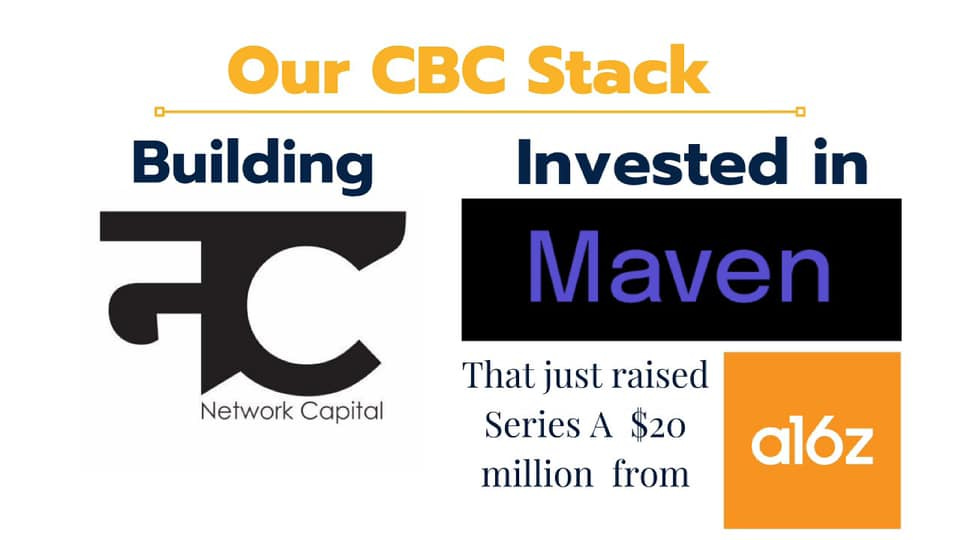Writers, Teachers: Underpaid Today, Millionaires Tomorrow
How the pandemic made teachers and writers realize their economic potential
This is the first of a two-part series where we focus on the untapped economic potential of teachers. Next one will be focused on writers. Let’s get started.
Towards the end of last year, I invested in an unnamed education company that was keen to unbundle the university experience. I liked their community-based approach and found their cohort based courses remarkably similar to the fellowships we run on Network Capital. The founders seemed to understand that education was so much more nuanced than just test preparation and other FOMO-fueled techniques to drive up the collective anxieties of parents and students.
Few months after my investment, that unnamed company found a name, product-market fit and a massive investment round ($20 Million) from Andreessen Horowitz. In just 120 days, teachers on Maven made $1 Million by sharing what they know to a bunch of serious, motivated learners.
The Underpaid, Overworked Teachers
In Finland teaching is considered among the most prestigious of jobs. It pays well, offers steep career growth and strong social capital. Breaking into teaching involves a series of fairly competitive exams. Only the very best make it.
This is not the norm in most countries. Most teachers are overworked and underpaid. Here we are only talking about serious teachers, not the ones who take up the profession only to slack off. Go to lower income schools in any country and you will see how classes really work. There students succeed not because of teachers but despite them. Yes, there are some exceptions but there are exceptions to everything. Let’s focus on trends, not outliers here, shall we?
COVID-19 put inordinate administrative overload on teachers. They not only had to redesign their lesson plans and keep “Zoomed Out” students engaged but also figure out ways to track progress, submit clunky performance updates, and make do with budget cuts across the board.
Two things happened.
First, “star teachers”, teachers loved by students, realized their importance in keeping the education system running.
Second, it occurred to them they didn’t really institutions. In fact, institutions made things slower and more bureaucratic. Also, institutions kept most of the money for themselves. There was no financial incentive to go the extra mile.
While many teachers don’t get into the profession to make money, there is nothing wrong with teachers trying to create new income streams for themselves.
Who is a teacher?
Network Capital started with the fundamental belief that every single person on the planet has something to learn and something to teach. All we need is a community for enabling skill sharing at scale. The first time I saw this in action was during my internship at Grameen Creative Lab, an initiative of Nobel Laureate Mohammad Yunus. There we trained beggars to become sales agents for a protein yogurt. Beggars were perfect for the job as they wandered about cities looking for alms and knew every street. We just had to complement their specific knowledge - knowledge that cannot be taught but can be learned - with training that made sense.
So who is a teacher? Is it someone with institutional affiliations? Someone with fancy degrees? Someone who enjoys knowledge sharing? Simply put, anyone with specific knowledge can be a teacher. That person just needs to figure out ways to make her/his students smarter in stipulated periods of time.
Some of our favorite teachers are ones we end up having long-term relationships with but that happens over the long term. The seeds of curiosity are planted in the early days of interaction and instruction.
21st century teachers will be internet-powered and community-oriented. Students will come to them despite their institutional affiliations.
Suppose someone has mastered enterprise sales but doesn’t want to sell anymore. No university teaches stuff like this but being good at sales is a life skill, even if you are a poet. Influencing, motivating, negotiating, getting to specific outcomes come in handy whether you are negotiating your book deal or figuring out ways to get more signups for your online course or webinar.
The person who is known in his/her circles as being good at sales might decide to translate all learnings into a cohort-based-course and create a channel to complement his/her monthly income. One day that person might quit her/his job and commit to it full time. We have so many incredible examples of people who have done that on Network Capital.
Take a look at Mahmoud Rasmi, a former university professor in Lebanon who quit to teach an online cohort-based-course on philosophy. His online class is so much more interesting that his offline one. He has a smarter cohort, doesn’t have to deal with university politics and controls his fate. Given the state of affairs in Lebanon, what Rasmi has built is nothing short of inspiring. He is earning thousands of dollars and having a blast doing it. Contrast that with the salary of a law associate in that country who earns $100 every 35 days. Or an engineer who earns $150/month, if lucky. Yes, that is how bad things are in Lebanon.
How will star teachers become millionaires?
On Maven, teachers charge around $1200 for a power-packed 4 week course. These teachers are usually the absolute best in their fields. I was asked to teach a course on community building this summer but couldn’t do it because we have the NC Summer School and the NC Side Hustle Fellowship happening together in June.
Normally cohort-based classes admit anywhere between 20 - 80 students. So if you are a star teacher, you can expect to make $24,000 - $96,000 for the month you teach on a platform like Maven. Maven is just one example. There are myriads of other platforms like that.
At $96,000, if you teach a cohort based course every month, you will be a dollar millionaire after year 1. This won’t be easy. Very few people will actually get there but it is very much possible.
Teaching is fun and immensely educational - for the teacher
Richard Feynman, one of the most renowned physicists, had a four-pronged strategy for learning anything. Take a look
Identify a subject that piques your interest
Teach it to a child
Identify gaps in your knowledge
Organize, simplify and TEACH
Teaching crystalizes your knowledge. With tools like stripe, zoom, Maven, Teachable, LinkedIn, Facebook, Twitter, Network Capital, Skype, TikTok you hack your mini university, and create a teaching job you love. If you do it well, money will not be a problem. More importantly, you will get smarter every single day. There is nothing quite like it.






